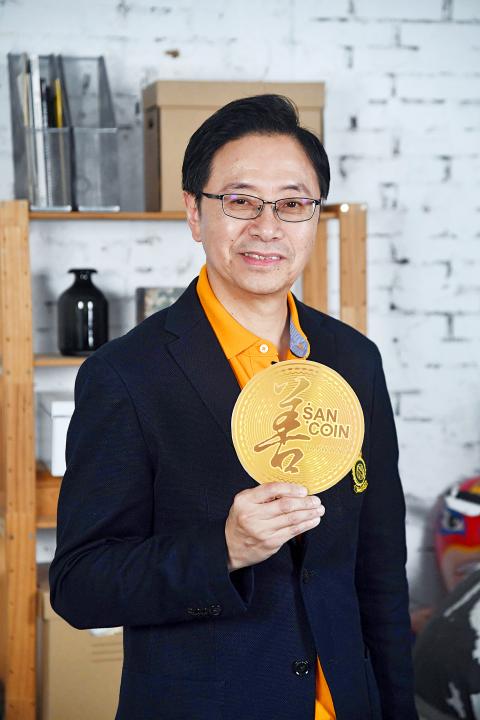Former premier Simon Chang (張善政) yesterday said he would run in next year’s presidential election as an independent candidate.
The decision followed careful deliberation, Chang said, adding that he is gathering a campaign team.
Only by breaking away from the fierce rivalry between the pan-green and pan-blue camps can Taiwan recuperate and recover its former glory, he said.

Photo: CNA
He would build his cross-strait platform on the premise of “prioritizing Taiwan,” while adhering to the “one China” principle as it is outlined in the Constitution — a notion he came up with after seeing the endless bickering between the two political camps over the so-called “1992 consensus.”
The “consensus” often advocated by former president Ma Ying-jeou (馬英九) has its merits, but the two political camps cannot agree on its meaning, he said.
The Constitution was written with “one China” in mind, so Chang’s cross-strait stance of helping Taiwan live up to the status of that “one China” should be acceptable to both camps, he said.
Asked to comment on the variables that his entry adds to the election and how it would affect the Chinese Nationalist Party’s (KMT) prospects, Chang said he is not a KMT member, so he would wait patiently and see who the party nominates as its presidential candidate.
He said he hopes to present a balanced addition to discussions about cross-strait relations and put an end to the “unnecessary bickering” between the pan-green and pan-blue camps over cross-strait issues.
It would be hard for his presidential candidacy signature drive to pass the threshold without the backing of a major party, Chang said, adding that it is unclear whether he could overcome that hurdle, but if he did, voters would have an alternative choice.
He said he would fashion his campaign around a slogan urging the pan-green and pan-blue camps to “end their political wrangling.”

A preclearance service to facilitate entry for people traveling to select airports in Japan would be available from Thursday next week to Feb. 25 at Taiwan Taoyuan International Airport, Taoyuan International Airport Corp (TIAC) said on Tuesday. The service was first made available to Taiwanese travelers throughout the winter vacation of 2024 and during the Lunar New Year holiday. In addition to flights to the Japanese cities of Hakodate, Asahikawa, Akita, Sendai, Niigata, Okayama, Takamatsu, Kumamoto and Kagoshima, the service would be available to travelers to Kobe and Oita. The service can be accessed by passengers of 15 flight routes operated by

Alain Robert, known as the "French Spider-Man," praised Alex Honnold as exceptionally well-prepared after the US climber completed a free solo ascent of Taipei 101 yesterday. Robert said Honnold's ascent of the 508m-tall skyscraper in just more than one-and-a-half hours without using safety ropes or equipment was a remarkable achievement. "This is my life," he said in an interview conducted in French, adding that he liked the feeling of being "on the edge of danger." The 63-year-old Frenchman climbed Taipei 101 using ropes in December 2004, taking about four hours to reach the top. On a one-to-10 scale of difficulty, Robert said Taipei 101

MORE FALL: An investigation into one of Xi’s key cronies, part of a broader ‘anti-corruption’ drive, indicates that he might have a deep distrust in the military, an expert said China’s latest military purge underscores systemic risks in its shift from collective leadership to sole rule under Chinese President Xi Jinping (習近平), and could disrupt its chain of command and military capabilities, a national security official said yesterday. If decisionmaking within the Chinese Communist Party has become “irrational” under one-man rule, the Taiwan Strait and the regional situation must be approached with extreme caution, given unforeseen risks, they added. The anonymous official made the remarks as China’s Central Military Commission Vice Chairman Zhang Youxia (張又俠) and Joint Staff Department Chief of Staff Liu Zhenli (劉振立) were reportedly being investigated for suspected “serious

Taiwanese and US defense groups are collaborating to introduce deployable, semi-autonomous manufacturing systems for drones and components in a boost to the nation’s supply chain resilience. Taiwan’s G-Tech Optroelectronics Corp subsidiary GTOC and the US’ Aerkomm Inc on Friday announced an agreement with fellow US-based Firestorm Lab to adopt the latter’s xCell, a technology featuring 3D printers fitted in 6.1m container units. The systems enable aerial platforms and parts to be produced in high volumes from dispersed nodes capable of rapid redeployment, to minimize the risk of enemy strikes and to meet field requirements, they said. Firestorm chief technology officer Ian Muceus said